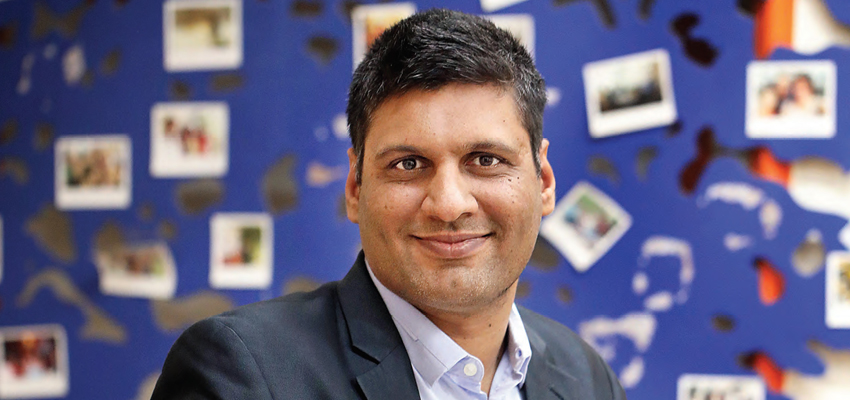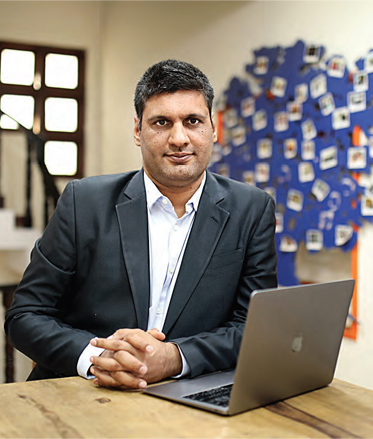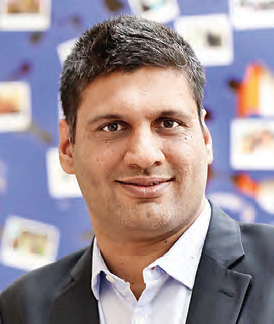Everyone a Changemaker

It is often said that anyone can change the world, but perhaps no leader embodies this timeless adage as well as Yashveer Singh, Executive Director, Ashoka Young Changemakers, a programme designed to identify, select and build a global community of Teen Changemakers. Yashveer truly believes that the best way to bring about societal change is to empower the youth. Having earned his MBA at the University of Oxford, he founded a youth non-profit to address talent inequity in the development sector and influence youth culture in India by inspiring and educating university students to pursue social innovation and entrepreneurship. His work has garnered universal acclaim and his name was even listed in the prestigious “Forbes 30 under 30 Asia” list. During a heartfelt chat with Corporate Citizen, Yashveer talks candidly about his vision for the youth, how the Covid-19 pandemic has changed people’s perspective, and what it takes to be a world-changing social entrepreneur
"Ashoka is a 50-year-old global network of social entrepreneurs. Bill Drayton started the organisation in 1980 and since then our network has been present in over 90 countries"

Corporate Citizen: Could you define your role as the Director of Ashoka Young Changemakers?
Ashoka is a 50-year-old global network of social entrepreneurs. Our founder, Bill Drayton started the organisation in 1980 and since then our network has been present in over 90 countries. When we started, our simple thought was to find social entrepreneurs and support them so that they would be able to scale their organisations even further. After 10-20 years of our existence, we saw that had the world been constant, social entrepreneurs would have solved almost all the existing problems and these problems would reduce. But the reality is that the world is dynamic and changes very fast. Ten years ago, technology-related challenges did not exist and the ill effects of technology weren’t felt.
What Ashoka realised after two decades of our work with social entrepreneurs is the answer to questions such as “what makes social entrepreneurs special?” or “what makes them do what they are doing to solve a particular problem?” One of the answers which we got was that most of these social entrepreneurs started their first attempt to solve a social problem very early in life, as young as when they were 15-16 years of age. What this made us realise is that their ability to create change comes because they have developed the ability, skillset, and mindset at a very young age. What we needed was many more people to behave, act and inspire others to create a change, similar to social entrepreneurs. For Ashoka, what was clear is that if we give the power of being a changemaker to very young people, then that is the only way to solve new problems. As new challenges emerge, everyone has the ability to counter those challenges at their own level. That was the larger objective.
Along with our founder, Bill Drayton, I conceptualised this programme called Ashoka Young Changemakers, where the idea was that we build a team of teen changemakers at a global level and these changemakers would, in effect, inspire the larger youth.
CC: Do you have any workshops? How do you achieve this objective?
We partner with lots of educational institutes, we share lots of stories of these young changemakers with networks of young people. We also use a lot of social media. Every culture can encourage a young person by telling him that if you feel that there is a challenge, can you attempt to solve it? My only appeal is that whatever position or role they are in, whether it is corporate or entrepreneurial life, if they can encourage youth in their lives, if they can encourage them to be changemakers, then we as a country or us collectively as humanity can develop young people having this ability. This needs to be that innate intrinsic ability of every young person to create change and that’s the only way they will be able to deal with these unprecedented challenges like Covid-19.
CC: Is there a conflict between your ideals and the philosophy of the corporate world, which is to take and never give? Is it a conflict or do you think it is becoming complimentary?
I think some or many corporates may perceive it as a conflict. What I can say is that partially what is demanded in the larger society. The forces of an ecosystem respond to the mindset of a larger population. What decisions a market is making or a particular corporate is making, is driven to a large extent on what it is that matters to people. At the moment, does it matter to people that behind the product that they are buying lie larger questions like how the corporates are treating their employees, what is their commitment to society and so on? I don’t think people are asking these questions. But imagine a new generation that will grow and ask what is good and what is not, and continuously ask questions. It will be very tough for a corporate to survive and sustain, if it is not aligned with the people’s mindset.
"Doing good for society has to be a core business interest of every corporate. Every business exists to solve a human problem, and it need not have to create new problems to solve existing ones"
CC: Do you think that is happening now? Do you think that Covid-19 has triggered that idea and action with them?
Even before Covid-19 hit, Ashoka was advocating to the world that we need to have empathy, we need to have change-making ability and so on. What Covid-19 did is it demonstrated to everyone that this needs to happen quickly. Everyone was impacted at a personal level. No one could ignore it. Covid-19 was a harsh reality check. You might be going after capital gains but what if our lives are in danger. Are we going to choose lives or are we going to choose a lot of money? What will you do with so much money anyway? You couldn’t even travel during the pandemic. All you needed was a house, a computer and the internet in order to work. People have understood that you don’t require much to live comfortably. For people to start doing differently, they need to first start seeing differently.
We are still a developing nation. For the generation before me, even attaining economic stability was a struggle. Both my parents were government employees and having a government job was so important. Today, there are cases where IAS, IPS people quit their jobs and experiment with their careers. Just the pursuit of economic stability isn’t the priority anymore. We have moved up from that. Now people ponder over what is the whole purpose of living. How do we live harmoniously? I still feel that changing the core mindset of adults will be slightly tougher than changing the mindset of young people. Imagine a whole generation that grows up thinking of being a changemaker for the good of everyone around them. Those are the ones who will be tomorrow’s corporate leaders, government leaders and business leaders. If they are innately and intrinsically those kinds of human beings who think of the world around them, then their decisions will also reflect this mindset. These individuals won’t just do CSR for compliance to a government policy and to just show to the world that they are doing something. Doing good for society has to be a core business interest of every corporate. Every business exists to solve a human problem, and it need not have to create new problems to solve one existing problem.
"One of my professors had shared a line with us. It went, ‘Act as if what you do makes a difference. It does.’ Whatever you do you need to act in a way as if it does create some sort of difference"

CC: How has the pandemic affected you?
Our professional and personal lives are so interlinked nowadays that almost one third of our life is spent on working and another third in sleeping. So, there is hardly any time for anything else. One of the biggest things that I have experienced is that because I worked a lot with young changemakers, I used to travel a lot across India and outside India as well. What I used to love is the interaction with those people, meeting with them and visiting their communities. But due to the Covid-19 restrictions, these meetings have come to a halt. And the next biggest impact is that whenever these stressful times come, we don’t often talk about well-being enough. Well-being means how we feel about the situation. Mental health as a subject is not talked about as often as it should be. I sense people are less hopeful of these uncertain times. They are struggling in different ways, specifically, young people who are graduating and have tremendous uncertainty about their careers. People who are in schools have uncertainty. You talk to those people regularly, so you feel that you can give them hope, just advise them to be more resilient but still when you see what they are actually going through, it does impact you at an individual level. This is another aspect of how the last year might have impacted me personally.
But I am still quite hopeful because even though these are trying and testing times, if humanity was ever ready to deal with such a situation, that time is now because we have science and technology, which is helping us get through this. Through technology, we are speaking to each other and sending the message out and making sure that as a community, we live together and help each other.
CC: Do you see Ashoka Young Changemakers collaborating with corporates? Do you think the time is now right and ready for corporate partnership?
The goal is how you make everyone a changemaker. A large part of our population is a part of corporates. Whether you are the CEO or an entry-level employee in a company, everyone can play some or the other role. We all have the scope to do better for others. In the way we conduct ourselves, in the way we make our decisions and the way we lead our organisations. Of course, we want Ashoka Young Changemakers to collaborate with corporates, which is a short-term goal but the longer-term goal is to inspire people. It should not be ad-hoc collaboration or partnership.
CC: You are recognised as one of the leading social entrepreneurs in Forbes 30 under 30 Asia list. Tell us about this recognition and how you felt receiving it?
I work for Ashoka and lead their programme globally. Prior to this, I was a social entrepreneur who had started a youth organisation. In my career, I have been working with young people and helping them to become social entrepreneurs and changemakers, and that’s largely been my summary of life. These recognitions make society take the cause you stand for more seriously. They make people take notice of your work. You can spend your life championing for a cause and doing good work but if people don’t embrace it then the impact will not be as much as you wanted it to be. When I launched the Ashoka Young Changemakers programme, Forbes Asia comes with list of ‘30 people under 30’ and I was listed at the 29th position in 2016. I realised two things from this recognition. First, the buzz around the ranking makes people take notice, and second, it helps you to connect with other people who are doing good work. It makes people take your work more seriously, which is a good and happy feeling. What is largely more important is the message which we are trying to propagate. What matters is if it is reaching as many people as possible and as long as that objective is served, it will always be a good feeling.
CC: You have your MBA degree. Why did you go for an MBA degree and how was it in the Business School of Oxford?
Before going to Oxford, I was at BITS Pilani where I did my undergraduate education. I keep telling people that for me, getting into BITS Pilani was much tougher. The competition at India’s premier educational institutions is much higher than it is globally. After graduating from BITS, I had started my youth not-for-profit. The focus of that enterprise was social entrepreneurship. The essential reason I chose Oxford Business School because it is the best school in entrepreneurship and social entrepreneurship. And their social entrepreneurship is rated as the best programme, even in comparison to other top universities like Harvard.
Secondly, for me, the desire for going for an MBA came from the idea that even if what you wanted to do in life was good you also need to be connected to the right people to make it a reality. You want to put your work in places and platforms where people can support you and with the speed you want. There are people who are well-intentioned and they are doing good work in their village. I just wanted to do this on a larger scale and for me, India is a large enough scale. It is a country of huge diversity. The whole decision of going to Oxford was based on whether it can help me in learning. I also did my research and I felt that the social entrepreneurs programme at Oxford was excellent and would provide me with the tools I needed in order to commit my life to help people. As I was focused on social entrepreneurship, their course curriculum was focused a lot on case studies, on social entrepreneurship, which was great learning because I don’t think that at the time Indian Business Schools had that kind of focus.
CC: What is the philosophy that you live by?
I remember during my first year at BITS Pilani, one of my professors had shared a line with us. It went, ‘Act as if what you do makes a difference. It does.’ Whatever you do you need to act in a way as if it does create some sort of difference, which is similar to the thinking what we are propagating through Ashoka in the world today. Whatever you do creates a difference in the lives of people and in the ecosystem around you. If every individual has this mindset, then the world will be very different.